Benzene in Drinking Water is Dangerous
Since 1974, when the Safe Drinking Water Act was passed by Congress, the task of determining the safest possible levels of water contamination has been the responsibility of the EPA (Environmental Protection Agency). This task involves the EPA determining standards for drinking water to reduce the risk of adverse health effects occurring. Today, the EPA is responsible for regulating 81 different types of potentially hazardous contaminants, which may be found in drinking water supplies. The EPA monitors physical, chemical, biological and radiological contaminants, setting a maximum contaminant level goal or MCLG for each. One particular contaminant, which has been in the mainstream media recently is benzene, which has been set an MCLG of zero parts per million.
What is Benzene?
Benzene is classified as a VOC or volatile organic chemical. It is found naturally in cigarette smoke, gasoline and oil. Benzene can also be formed during industrial processes or natural events such as forest fires. Benzene is often used in the process of manufacturing rubber, resins, synthetic fabrics and plastics. It is also used as a solvent in dry cleaning, printing and paints.
Benzene is particularly harmful as it is a known carcinogen. If it is ingested in drinking water, it has been shown to decrease blood platelets, cause anemia and increase the risk of developing cancer especially leukemia.
The main sources of exposure to benzene is cigarette smoke and gasoline. For most of the population, the risk of exposure from drinking water or consuming foods is much lower, but there is still a risk. There has been benzene detected in contaminated well water, certain foods, liquor and some bottled water. Water sources can be contaminated from benzene from landfill leaching or leaking underground storage tanks of gasoline.
Benzene in the News
The most recent instance of benzene water contamination was featured in the LA Times. The article documented that last summer officials from the Oil, Gas and Geothermal Resources California Division admitted that oil companies were inadvertently allowed to inject the wastewater from their oil production and fracking operations into a great number of disposable wells within protected aquifers around California for years. The result of these actions is that there are water supplies contaminated with a number of chemical byproducts including high levels of Benzene.
Reducing Your Risk
Since the EPA recommendation for benzene is an MCLG of zero, it is important that you ensure that you eliminate potential exposure. While this may seem a little overwhelming, it is possible for homeowners to take preventative measures. There are a number of domestic water treatment options which can remove benzene from your water. While conventional water softeners will generally not remove benzene, there are granular or charcoal activated carbon filters which are rated to remove benzene from your supply of drinking water. These are available as countertop devices, under counter units or whole of house systems. Additionally, if your home obtains drinking water from a private well, it is important to ensure that your water is regularly tested to check for the presence of benzene. This is especially important if you live near any industrial operations which may be using or producing benzene, such as oil drilling, dry cleaning or fracking.
Symptoms of drinking benzene contaminated water supplies include stomach irritation, vomiting, sleepiness, dizziness, irregular heartbeat and convulsions. If you are concerned about your exposure to benzene or are suffering from any of these symptoms, it is important that you have your drinking water supply tested.
About The Author:
Greg Scott is President of Valparaiso based Miracle/EcoWater Systems, the premier water conditioning company in Northwest Indiana serving the Lake, Porter and LaPorte County areas. A 3rd generation water treatment professional, Greg grew up in the family owned business started by his grandfather in the late fifties. He has made water treatment his life and under his direction and high-standards, the company’s water treatment experience, knowledge, and products are unrivaled in region.
Back to
